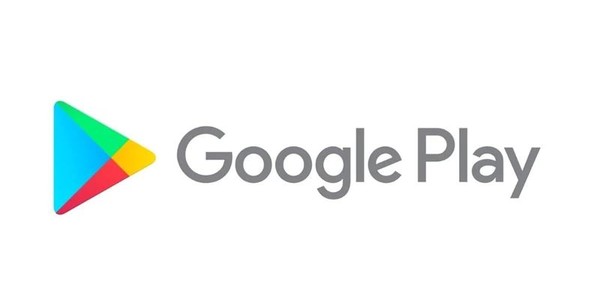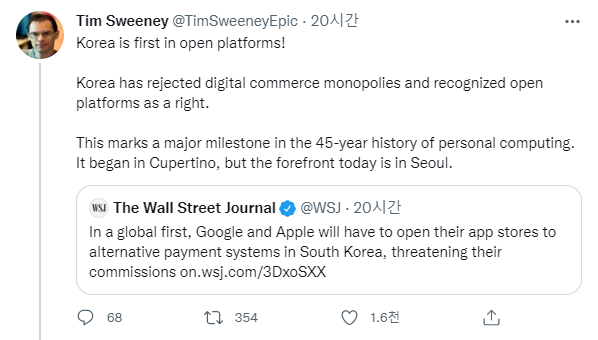Do you know about in-app payments? According to Yonhap News TV on September 2nd, the Google application market Play Store accounts for more than 70% of the Korean app market. This means that smartphone users often have to go through Google to use or purchase apps. Google announced that it would make in-app payments mandatory when selling apps in the Play Store from October of this year. Many people argued that the government should regulate this, calling it Google’s power trip of paying fees. Accordingly, the revised Telecommunications Business Act passed the National Assembly on August 31st. As Korea implemented regulations on the app market for the first time in the world, it drew attention from domestic operators as well as overseas. Some people predict that regulations will be made not only on Google but also on large domestic online platforms. What are the background and details of the revised Telecommunications Business Act and the changes that will occur? Let's find out in detail.
Abusing Power of Google in the App Market

Probably everyone has used Google before. Numerous domestic app developers and sellers are passing through Google's app market, Play Store, to sell apps to consumers. However, on September 29th, 2020, Google announced the mandatory "in-app payment" for all digital content apps. In-app payment literally means making payments within the smartphone app itself, a method in which consumers pay through the own development system of app market operators such as Google or Apple when paying for charged content within the app. If in-app payments become mandatory for all digital content apps, consumers cannot pay through other external payment systems such as account transfer or mobile phone payment if they purchase, for example, webtoons from the Naver Webtoon app. As in the case of current mobile game apps, payments can only be made through Google's own payment system. As a result, it is necessary to make in-app payments through the Play Store from January 20th, 2021. And from October 1st, 2021, if it is previously registered. Due to Google’s policy, domestic app developers and sellers are in a situation to pay about 150 billion won per year to Google.
Opposition to the Forced In-App Purchase
Industry's Opposition
App market related industries strongly protested against Google’s policy. On February 18th, 17 organizations covering the Internet industry and civic groups, including the Korea Internet Corporations Association and The Voice for Consumers, issued a statement containing, "I hope the National Assembly will keep its promise to protect app developers and consumers by banning unfair payment methods in the app market. […] Please pass an amendment to the Telecommunications Business Act as soon as possible to prohibit unfair behavior by global app market operators." In addition, the Korea Internet Corporations Association noted that if payments through the Play Store are mandatory, related domestic business sales will decrease by about 2.3 trillion won per year, and production reduction effects will also reach 2.9 trillion won. In addition, as many organizations and operators including webtoon and web novel creators protested, Google extended the application period of mandatory in-app payments from October 2021 to April 2022. Korea is the second country to extend the application period of mandatory in-app payments following India in October 2020. Google also announced a plan to change the commission ratio from 30% to 15% for companies with annual sales of less than $1 million, that is, less than about 1.18 billion won.
Is the Price Burden Passed on to Consumers?
Despite Google's move to change its in-app purchase policy, many people still strongly opposed it. A typical reason is that the price burden can be passed on to consumers. Google noted that for less than $1 million in annual sales, the fee ratio will be changed to 15%, so only developers in the top 0.1% will pay 30% of the fee. However, the problem is that most consumers are concentrated on the services provided by these top 0.1% of developers. In particular, services frequently used by domestic consumers such as Kakao and Facebook are at the top in the order of sales. Eventually, if the fees that the top developers will pay become the mandatory 30%, each developer will have no choice but to raise the price of the content provided. And this will eventually shift the price burden to consumers. In fact, Apple introduced in-app payments from the launch of its own app market, App Store, and mandated fees for all content profits through in-app payments to 30%. Accordingly, some services already differ in the price of content sold on Android and Apple's mobile devices. For example, as of October 2020, the music platform "Melon" had an Android terminal fee of 11,400 won per month while Apple's iOS terminal fee is 15,000 won. According to BLOTER News in August 2021, staff from a content production company said, "The 30% commission rate is difficult to cover with margins, so it is highly-priced in Apple devices unavoidably." […] If Google's in-app payment becomes mandatory, the price will inevitably rise, which will eventually cause damage to consumers.”
The World's First App Market Regulation
The Revised Telecommunications Business Act
Eventually, the National Assembly stepped up on the issue of power abuse by large companies. Since July 2020, seven members of the National Assembly's Science, ICT, Broadcasting, and Communications Committee have proposed a revision to the Telecommunications Business Act that regulates Google's mandatory in-app payment system. The members merged six of the seven proposals into one, and the bill passed a plenary session in July of this year. On August 25th, the revised Telecommunications Business Act passed the Legislation and Judiciary Committee and passed the National Assembly on August 31st. Through the revised Telecommunications Business Act, Korea has implemented regulations on the app market for the first time in the world. Specifically, the revised Telecommunications Business Act prohibits the act of forcing certain payment methods for app market operators such as Google and Apple. Therefore, it has become virtually impossible for Google to force in-app payments. In addition, the Act prohibits app market operators from unfairly deleting mobile content or delaying their evaluation. For such a law that regulates Google's forced in-app payments, on September 2nd, President Moon Jae-in said with expectancy, “It is something to be proud of that we have defined the obligations of platform operators by law for the first time in the world.”
Responses to the First Regulation
With the passage of the revised Telecommunications Business Act, the fee burden, which was scheduled to be imposed in October, has disappeared, and many industries welcomed it. Park Sung-ho, chairman of the Korea Internet Corporations Association, said, "We expect the passage of the revised Telecommunications Business Act to guarantee the rights of creators and developers and create a fair app ecosystem where users can enjoy various contents at a lower price." Jeong Mi-na, head of the Korea Startup Forum's policy department, added that "it is encouraging that Korea seems to have laid the foundation for fair competition for the first time in the world." Google said it would abide by the Act. Shortly after the approval of the revised Telecommunications Business Act, Google expressed its position, saying, "We are looking for ways to comply with the law while maintaining a business model that supports high-quality operating systems and app markets." Many foreign countries and companies are also paying attention to the world's first app market regulation. Bloomberg News said, "It has set a precedent for significant changes in the App Store business, a major source of revenue for Apple and Google. […] It is expected that other countries will bring out similar movements." Citing an article on Twitter stating that the revised Telecommunications Business Act passed the National Assembly, Epic Games CEO Tim Sweeney said, "Korea is first in open platforms! Korea has rejected digital commerce monopolies and recognized open platforms as a right. […] I am a Korean!"

Concerns
The revised Telecommunications Business Act has clearly received a lot of expectations, but on the other hand, voices of concern are also expressed. The industry predicts that Google can find workarounds. Earlier, Google mentioned the cost of building and maintaining an app market in its statement. Therefore, rather than charging fees through in-app payments, there is a possibility that they will choose a detour to find the cost of building and maintaining an app market by taking additional fees. For example, while allowing external payments, a separate fee can be requested for external payment in the name of an app market play store use fee. Also, additional costs can be paid in proportion to the number of app downloads. In addition to concerns that Google and Apple could charge high fees in other ways avoiding the Act, the possibility of submitting a constitutional petition for the Act has also been raised. Usage of an integrated payment system by companies becomes a basic model for the platform business. So, it can be argued that banning the in-app payment system through law violates the essential content of the freedom of business guaranteed by the Constitution. In other words, since the in-app payment system corresponds to the essential content of the platform business, this means that it is the same as banning the platform business itself. In addition, some predict that Google and Apple will argue that the Act is a violation of the national treatment of the Korea–United States Free Trade Agreement. National treatment means that the nation should treat foreign people equally with its own people. Since the Act was revised for the purpose of regulating Google and Apple practically, it can be seen as an unreasonable and discriminatory regulation against American companies. Many operators and industries continue to pay attention to the movements of Google and Apple.
Will It Lead to Regulations on Domestic Platforms?

The platform originally refers to a place where trains and subways come and go. Online platforms serve as these platforms online. In other words, it will be a space where consumers and various services meet. Naver and Kakao are representative online platforms in Korea. However, the issue of monopoly on online platforms continues to arise. On September 14th, 2021, Lee Chang-young, a researcher at Yuanta Securities Korea, said, "Online platforms have many virtuous functions, but if they become a monopoly and have more than 50% of the market share, the possibility of abuse of market dominance that the Monopoly Regulation and Fair Trade Act concerns can be raised." In fact, Kakao T, a taxi calling app from Kakao Mobility, a Kakao affiliate, is a perfect example, with 91% of the market share. In major messenger apps, Kakao Talk recorded a market share of about 87% in August based on MAU(Monthly Active Users). In addition, Kakao affiliates, of which there were 45 as of 2015, surged to 158 by the first half of 2021, achieving significant growth. However, there was a lot of controversy by raising platform fees and usage prices after charging low fees in the areas of small business owners such as chauffeur service and flower delivery drivers to drive out competitors and gain an exclusive position.
In this situation, many people predict that regulations aimed at Google and Apple could be applied to large domestic online platform companies. Political circles are gradually moving to regulate large domestic platforms such as Naver and Kakao after passing the revision of the Act. On September 8th, 2021, according to the IT industry and politicians, a debate on measures to eradicate unfair trade and protect the ecosystem of alley commercial districts was held targeting Kakao. This is unusual for ruling party members to hold a debate targeting a specific company. According to the Digital Times on September 9th, the main spokesperson for the Blue House said, "We will carefully discuss it with the National Assembly while listening to the voices of related parties regarding the gradually expanding platform projects and workers." The Financial Services Commission also announced regulations on Naver and Kakao's financial platforms, Kakao Pay and Naver Financial. Discussions on this are expected to continue in the future.
As Google announced its policy to mandate in-app payments, voices of criticism and various regulatory demands were expressed saying it is a power abuse of the large platform. On August 31st, 2021, the revised Telecommunications Business Act passed the National Assembly at a time when concerns were expressed that Google's coercion of in-app payments could increase the fee burden on operators and further shift the price burden to consumers. Accordingly, various companies and media abroad, along with domestic industries and operators, expressed their expectations. However, Google and Apple may bypass the Act and charge their fees in other ways. In addition, it seems possible to argue that the Act violates the constitution and free trade agreements. As the regulations on Google and Apple are also expected to influence large domestic platforms in the future, continuous attention will be needed. CAH looks forward to a positive change in the app market.

